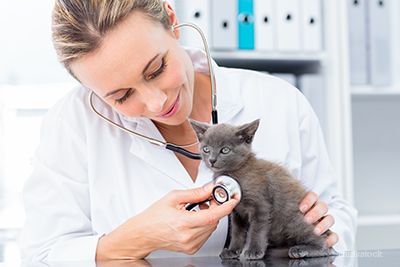
Congratulations! You have a new kitten! If it has been some time since you had a kitten, you may be surprised that, just as with raising a baby, recommendations can change quickly. Indeed, much has changed over the last few years when it comes to kitten care. I always recommend that the first outing for your new kitten should be to your veterinarian. This will ensure that you’re off to a great start on a path to lifelong health.
What might your kitten’s checkup include?
The first thing your veterinarian will likely do is perform a complete, physical examination. Most veterinarians will use their hands to palpate or feel your kitten from nose to tail. You may notice that your veterinarian will feel the kitten’s tummy and listen to the kitten’s heart and lungs using a stethoscope. Other visual inspections may include:
- Checking the kitten’s ears for infection and parasites like ear mites
- Checking the kitten’s genitals to be sure they are normal
- Checking the kitten’s teeth and discussing brushing and oral hygiene
Much of what your veterinarian does may go unnoticed. For example, your kitten’s movement and disposition will probably be evaluated too.
What might your veterinarian discuss?
Your veterinarian might discuss preventive health measures such as:
- Your kitten’s nutrition (including dietary suggestions)
- Testing for certain viral infections like Feline Leukemia and Feline Immunodeficiency Virus.
- Vaccinations that your kitten should receive
- Parasite preventives to protect from problems like heartworms and intestinal worms
- A preventive care plan
- Flea and tick control (including product suggestions)
- Training your kitten
Your veterinarian may ask you to bring in a stool sample to check for worms but, because you’re bringing in a kitten, de-worming will probably be advised even if nothing is found.
What should you ask your veterinarian?
One of the most important things your veterinarian will do is answer your questions. Kittens are a delight but can be a real challenge and it is important to be comfortable asking questions of your veterinarian. Don’t be shy; this is a great opportunity to strengthen the bond between you, your kitten and your veterinarian.
Like with children, your kitten should see your veterinarian every few weeks at first, and your veterinary practice will set a schedule for your next appointment.
You and your veterinarian are your kitten’s best health advocates. Together, you can make sure that every system is checked and all of your questions are answered.
If you have any questions or concerns, you should always visit or call your veterinarian -- they are your best resource to ensure the health and well-being of your pets.
